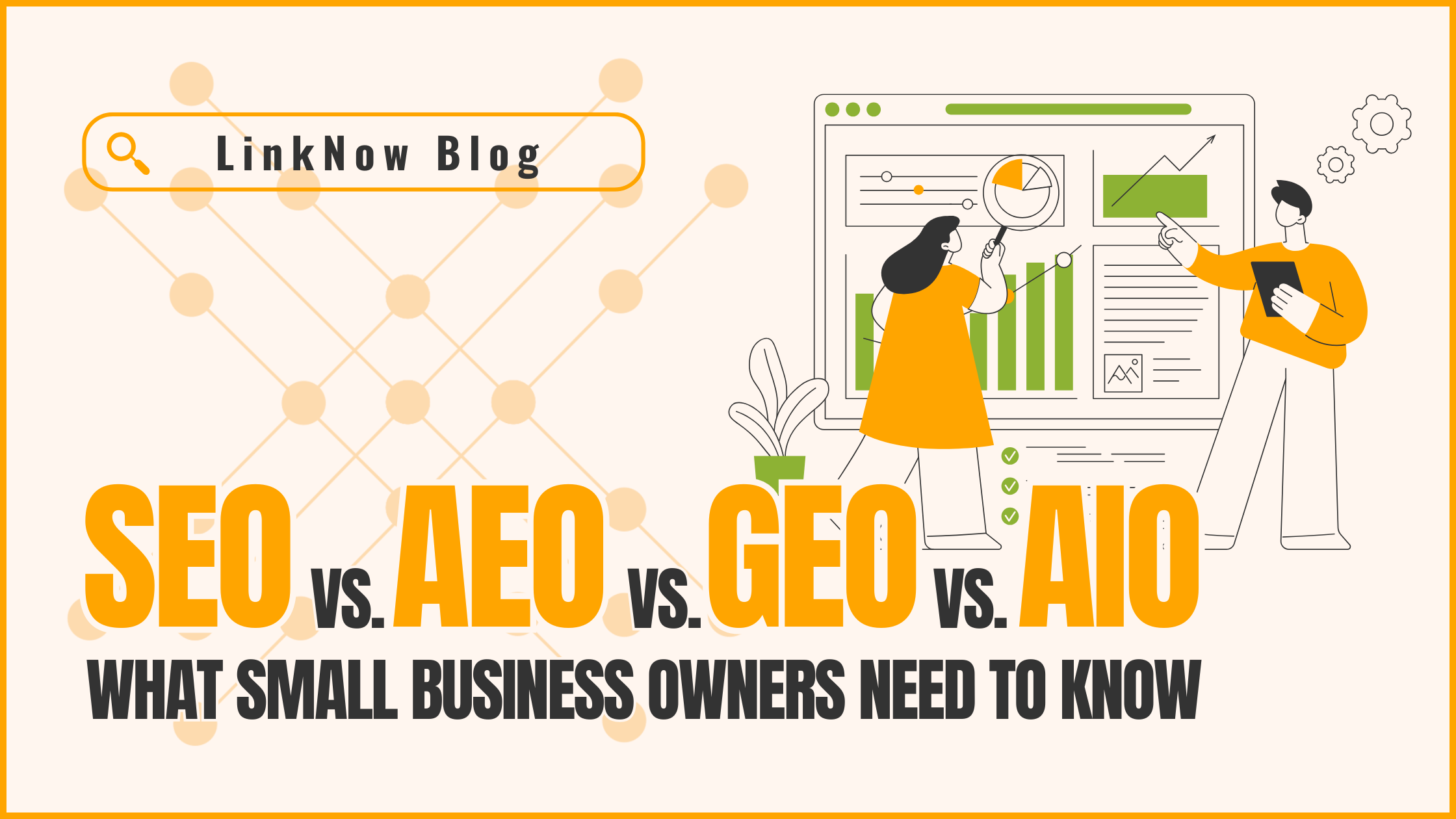
Overview
This guide breaks down the rising digital marketing terms SEO, AEO, GEO, and AIO—explaining what they mean, how they overlap, and why creating helpful, AI-ready content is the key to staying visible online.
Highlights
- • Quick Recap: What Exactly Is SEO Today?
- • Understanding the New Players: AEO, GEO, and AIO
- • How Is AI Changing Online Information Discovery?
- • Why Everything Is Ultimately Still SEO
- • Stay Adaptable, Because the Only Constant in Digital Marketing Is Change
Introduction
It’s no secret that digital marketing moves fast, and what worked last year might already be outdated. With AI evolving and search platforms changing how they deliver results, it can feel like the rules of online visibility are constantly being rewritten.
For small business owners trying to keep up, the growing list of new terms and acronyms can be overwhelming. Things like SEO, AEO, GEO, and AIO sound technical, sometimes redundant, and often unclear.
That’s why we created this blog post. We’re breaking down these buzzwords, explaining what they mean in plain English, and showing how they all point to the same thing: helping people find accurate, helpful content online.
Whether you’re new to digital marketing or just need to cut through the noise, this guide will show you how these concepts are connected.
Quick Recap: What Exactly Is SEO Today?

Even if you’re just dipping your toes into digital marketing, you’ve likely come across the term SEO, which stands for search engine optimization. At its core, SEO involves optimizing your website and its content to perform well in search results on traditional search engines like Google and Bing. Effective SEO helps your small business appear higher in search rankings, thereby boosting visibility and driving valuable organic traffic to your website.
That said, SEO is a constantly moving target. Gone are the days when sprinkling keywords throughout your pages were enough to rank online. Today, SEO encompasses a broader strategy that includes:
- • Relevant keywords: Understanding and using the exact words and phrases your potential customers are searching for.
- • High-quality backlinks: Building credibility by gaining links from authoritative websites, signaling trust to search engines.
- • Technical optimization: Ensuring your website loads quickly, is mobile-friendly, and is easily navigable.
- • Superior user experience: Creating content that’s engaging, helpful, and easy to consume, keeping visitors on your site longer.
SEO in 2025 by the Numbers
Why does all this matter so much? Because search engines remain the go-to starting point for most consumers online. In fact, a this BrightLocal study found that 87% of consumers use Google to evaluate local businesses.
For small businesses, this statistic highlights a critical reality: appearing prominently in search results can be the difference between being noticed by potential customers and being lost in the digital shuffle. SEO remains one of the most cost-effective ways to increase visibility, attract new customers, and ultimately grow your business.
In short, the need for optimization isn’t going anywhere, but the best practices for optimization will continue to shift as technology evolves and user behavior changes. Staying current with best practices will ensure your business stays visible, competitive, and profitable online.
Understanding the New Players: AEO, GEO, and AIO
If you thought keeping up with SEO was challenging, get ready for three new acronyms making waves in digital marketing: AEO, GEO, and AIO. But don’t panic—these terms might sound complex, but they’re simply new ways to describe how your content reaches customers through emerging technology.
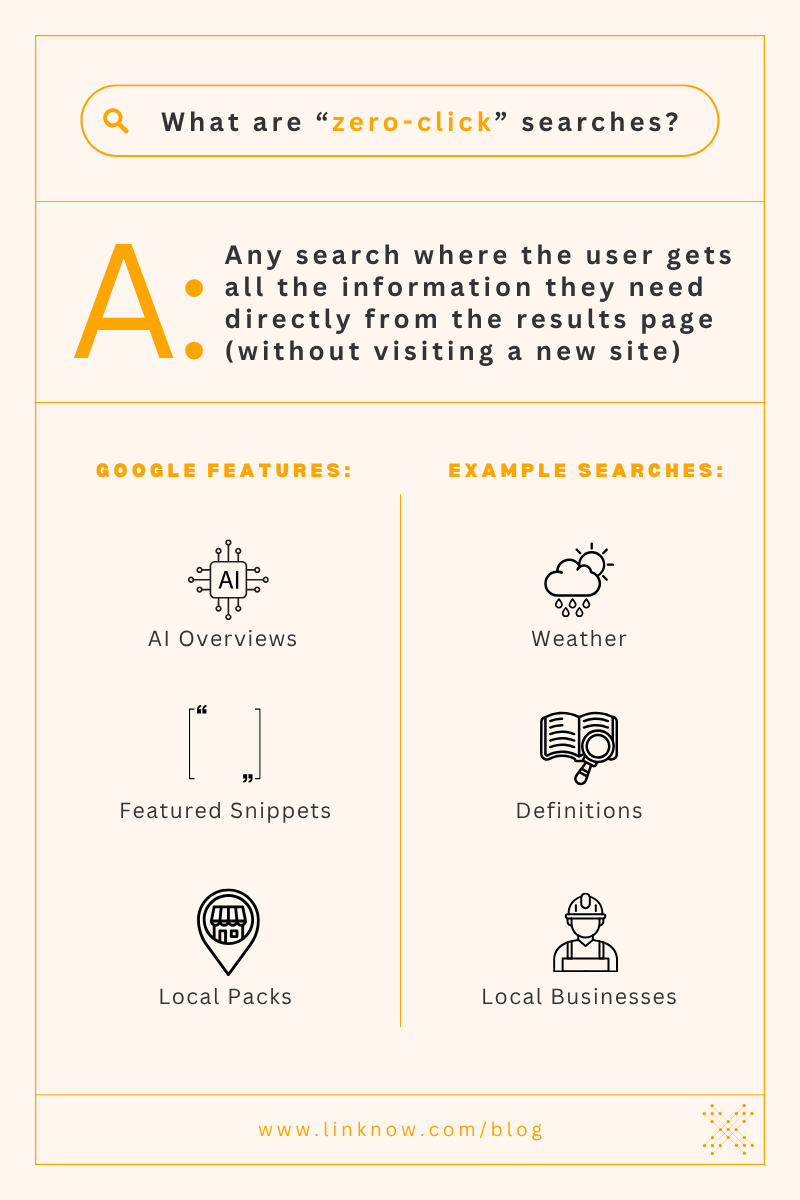
Here’s a straightforward breakdown:
Answer Engine Optimization (AEO)
What Is It?
Answer engine optimization focuses on creating content that directly answers user questions, especially through voice assistants like Siri, Alexa, or Google Assistant and in featured snippets at the top of search results. This is increasingly important as more people turn to voice search and “zero-click” results.
Real-World Scenario
Imagine someone asks, “Hey Siri, what’s the best landscaping company near me?” Instead of listing websites, Siri gives a concise, direct answer—maybe even naming your business. That’s AEO at work.
Why Does It Matter?
Voice searches and zero-click results are rapidly becoming mainstream. By capturing these answer spots, you instantly position yourself as a trusted expert without the user needing to scroll or click.
How Can You Optimize for AEO?
- • Provide direct, clear answers to frequently asked questions.
- • Structure your website content in easy-to-read FAQ formats.
- • Use conversational, natural language to match how people speak when using voice search.
- • Research the featured snippets currently appearing in your industry and aim to deliver even better answers.
- • Add schema markup (structured data) to your site, especially FAQPage, HowTo, or Product, so search engines can easily find and display your answers.
Generative Engine Optimization (GEO)
What Is It?
Generative engine optimization involves structuring content so that it becomes a trusted source for AI-generated answers from platforms like Google’s AI Overviews (formerly SGE), ChatGPT, Perplexity, and other large language model-powered tools. GEO focusing on positioning your content to be selected, summarized, and cited by AI engines when they generate direct responses for users.
Real-World Scenario
A user asks ChatGPT, “What are the best methods of landscape design?” Instead of returning a list of links, ChatGPT compiles and summarizes content from various trusted sources—including your content— into a clear, informative answer.
Why Does It Matter?
AI tools don’t rank content like traditional search engines. Instead, they extract and combine answers from sources they recognize as trustworthy, clear, and relevant. Becoming an AI-trusted source helps your business gain valuable visibility and credibility even if you’re not in the top organic rankings.
How Can You Optimize for GEO?
- • Ensure your content is clear, structured, and logically organized.
- • Use schema markup to help AI easily understand your content.
- • Include clear headings and bullet points to highlight key information.
- • Offer original insights, current data, or examples to establish authority.
AI Optimization (AIO)
What Is It?
Artificial intelligence optimization is the practice of structuring and enhancing content so it can be easily understood, indexed, and utilized by AI systems in various applications, from search engine summaries to content recommendations like Google’s Discover feed. AIO ensures your content is not only searchable, but also visible and relevant for modern content discovery.
Real-World Scenario
A homeowner is browsing Google Discover and sees a blog post titled “Top 5 Backyard Design Tips” from a landscaping company. They didn’t search for it, it was recommended automatically because Google’s AI understood the post answered common landscaping questions in a helpful, well-structured format.
Why Does It Matter?
AI systems now play a major role in deciding which content is shown to users even before they search. As consumers increasingly rely on AI-driven recommendations and curated content, businesses that aren’t optimized for AI risk becoming digitally invisible. Investing in AI optimization means more visibility in high-traffic discovery channels and reaching audiences earlier in their decision-making process.
How Can You Optimize?
- • Create structured, semantically-rich content that clearly answers specific user questions.
- • Write in a conversational tone that aligns with natural language queries.
- • Answer specific user questions directly and helpfully.
- • Maintain accuracy, relevance, and depth in your content to help AI identify and use your material as a credible resource.
How Is AI Changing Online Information Discovery?
Artificial intelligence has quickly become integral to everyday life and dramatically transformed how people seek out and consume information. For small business owners, understanding these changes is critical to maintaining online visibility.
The AI Effect: Transforming User Behavior
The widespread use of AI-powered tools, especially voice assistants and generative AI platforms, marks a paradigm shift in the way users interact with digital content. Voice assistants such as Siri, Alexa, and Google Assistant have made conversational searches commonplace, meaning users now frequently ask questions directly rather than typing them out.
At the same time, generative AI like ChatGPT has exploded in popularity, boasting over 700 million active users per week as of August 2025. This rapid adoption demonstrates a clear preference among users for quick, summarized, conversational-style answers rather than traditional lists of search results.
Google’s Shift To Artificial Intelligence
Recognizing this change, Google introduced its AI Overviews (formerly Search Generative Experience), providing AI-generated summaries directly on search result pages. Instead of clicking through multiple websites, users now frequently find their answers neatly summarized at the top of Google search results, which reduces the need to click on individual website links.
The Impact on Web Traffic and How Your Business Can Adapt
The rise of zero-click searches (queries answered directly by AI) means fewer visitors clicking through to websites. While this presents a challenge, it also offers new opportunities.
Your business can adapt by:
- • Optimizing for featured snippets: Aim to provide concise, authoritative answers to common questions, increasing the likelihood your content will appear in AI-generated answers.
- • Enhancing visibility through schema markup: Help AI platforms clearly understand your content to improve your chance to become a trusted source.
- • Creating content that encourages clicks: Provide valuable information upfront, but include enticing details or offers that motivate users to visit your site for more information.
Why Everything Is Ultimately Still SEO
Despite the flurry of new acronyms—AEO, GEO, AIO—the fundamental objective behind all these terms remains consistent: delivering accurate, helpful, and timely answers to users’ questions. Each strategy, at its core, emphasizes creating high-quality content that meets user needs clearly and quickly.
When boiled down, most business owners don’t need to think of these new terms as distinct marketing channels to focus on. Instead, they are merely an evolution of SEO. Focus on optimizing your content and you’re guaranteed to find success online.
Reinforcing Google’s EEAT Guidelines
Google’s EEAT principle—experience, expertise, authoritativeness, and trustworthiness—remains central to effective online content. EEAT has been a key aspect of traditional SEO since it was introduced, but it’s equally essential for optimizing content for AI-driven platforms and generative engines.
Why? Because AI tools, including Google’s AI Overviews and ChatGPT, rely heavily on sources that clearly demonstrate:
- • Experience: Practical, firsthand knowledge.
- • Expertise: Deep understanding and specialization in your industry.
- • Authoritativeness: Recognition by other trusted sources (backlinks, references, etc.).
- • Trustworthiness: Accurate, transparent, and secure information delivery.
The Overlap Between New Strategies and Traditional SEO
While terms like AEO, GEO, and AIO may sound new and distinct, their fundamental practices closely align with traditional SEO. All involve content that’s optimized, structured, reliable, and user-friendly.
In fact, Google itself has stated that specific AEO or GEO strategies are not necessary for ranking in its AI overviews.
Instead of getting lost in the jargon, small businesses should prioritize creating helpful, human-first content, ensuring it’s easily discoverable, digestible, and valuable—whether by humans or AI.
Stay Adaptable, Because the Only Constant in Digital Marketing Is Change
In the fast-moving world of digital marketing, the only thing you can count on is change. Algorithms update, platforms introduce new features, and consumer behavior shifts seemingly overnight. For small business owners, this can be both exciting and exhausting, but staying adaptable is what separates thriving businesses from those that fall behind.
From Google Updates To AI Overhauls
Google alone updates its search algorithm thousands of times each year—some minor, others game-changing. On top of that, the rise of AI-generated content, new platforms like ChatGPT and Perplexity, and shifts toward voice and zero-click searches all signal one thing: the way people find and interact with information is changing fast.
This constant progression means the SEO strategy you used last year—or even last month—might not be enough today.
Don’t Chase Every Trend—Focus on What Lasts
It’s tempting to chase every new buzzword, hack, or shiny tool that promises quick wins. That said, instead of rewriting your strategy with every tech update, you should aim to build a strong foundation of evergreen, people-first content that adapts easily to new formats.
Long-term success doesn’t come from reacting to every algorithm tweak. It comes from consistently creating content that’s:
- • Genuinely helpful
- • Easy to understand
- • Backed by your expertise
- • Optimized for how people actually search today
Stay Curious, Stay Current
Set a regular schedule to review your digital strategy, whether quarterly, bi-annually, or tied to key performance trends. Check your analytics, audit your content, and look at how users are finding you. If you notice a drop in traffic or engagement, investigate where it’s coming from and adapt accordingly.
Remember: the platforms may change, but your goal stays the same—connect with your customers in meaningful, helpful ways. Staying flexible and focused on value is the best way to future-proof your online presence.
Get Found in the AI Age With LinkNow’s Help
As AI continues to influence how people search, scroll, and select services, your business can’t afford to stay static. Voice queries, AI summaries, and zero-click results are no longer futuristic ideas—they’re part of the customer journey today.
But here’s the good news: you don’t have to chase trends on your own to keep up. You just need a marketing partner who understands how to keep your content clear, current, and ready for whatever comes next.
Let the team at LinkNow handle the ever-evolving world of digital marketing so you can focus on running your business. From SEO to AI-readiness, we help small businesses like yours build visibility, trust, and long-term growth online. Contact us today to learn more!

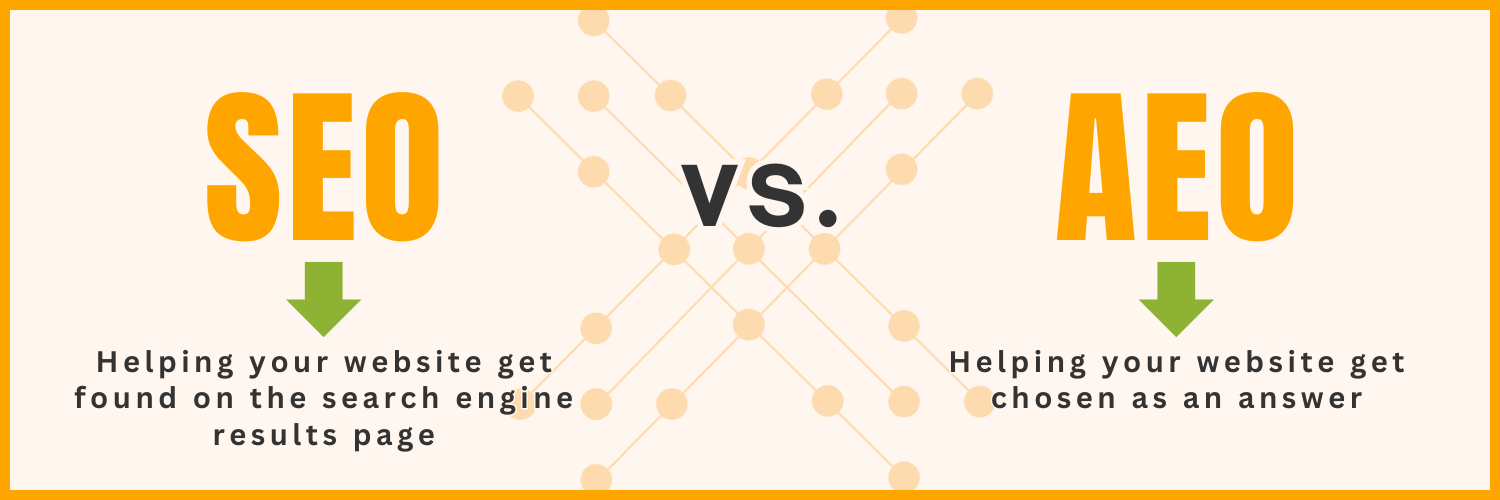
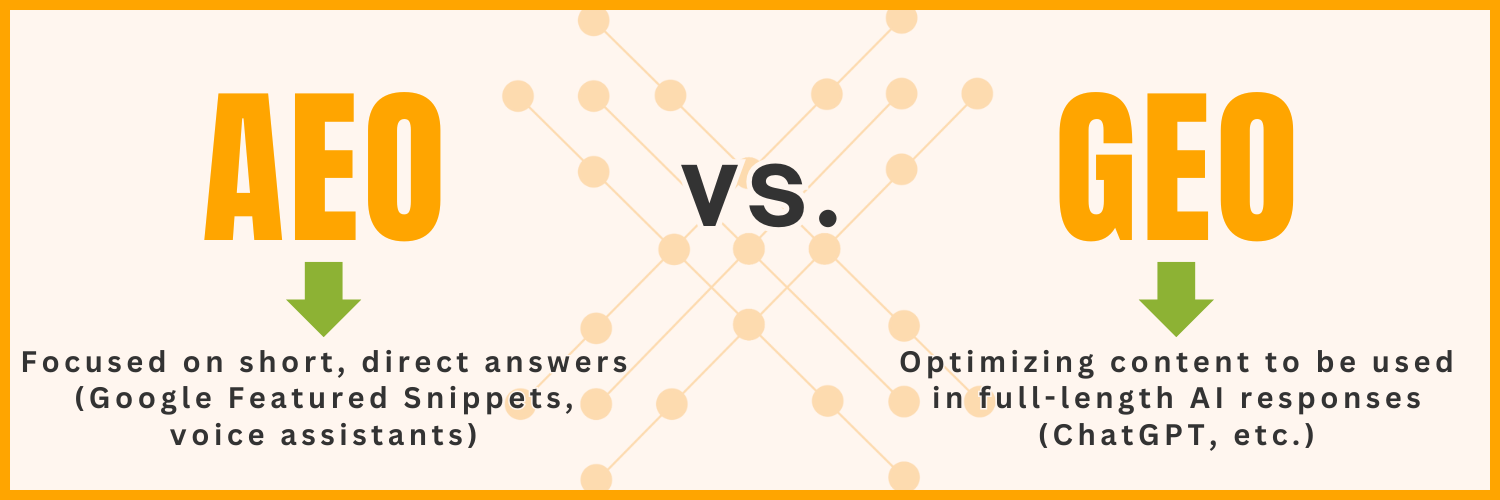
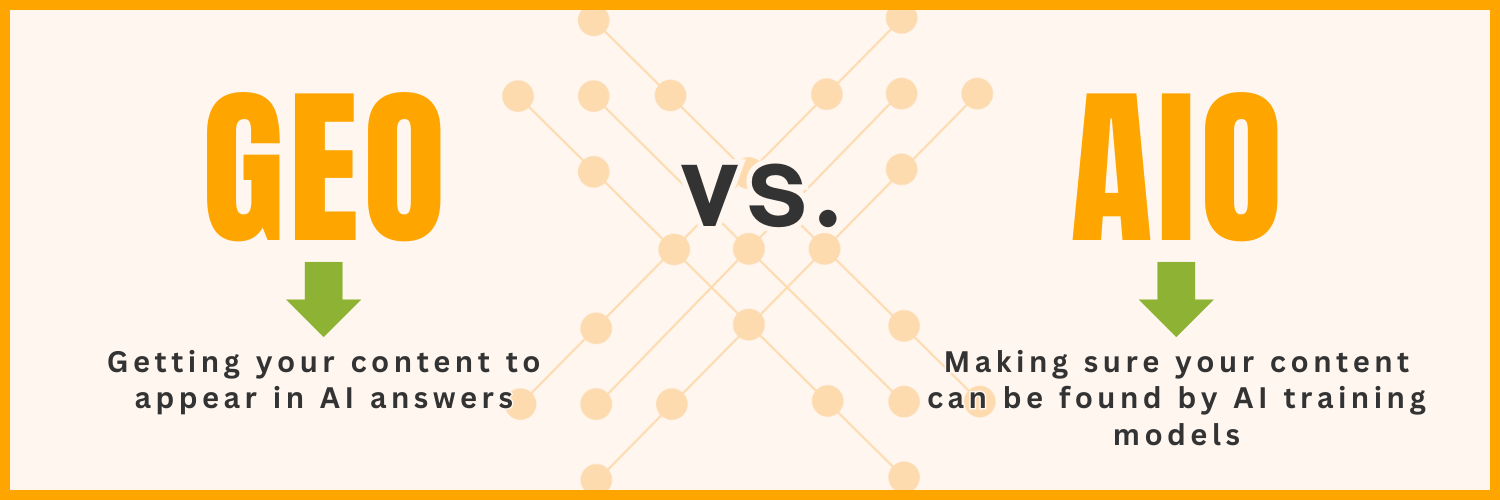


Thanks for the easy to read explanation, Tyson and LinkNow. With so many unknowns about how to make an impact in the digital space (especially in the age of AI and LLMs), it’s nice to have some trusted Canadian SEO experts I can turn to for guidance. Thank you!